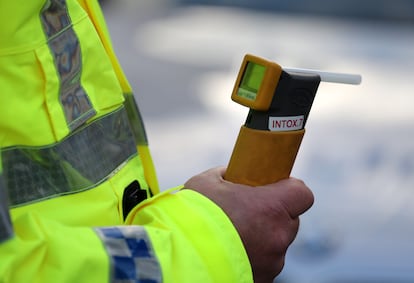A breathalyzer test leads to a diplomatic clash between Argentina and Russia
The Russian Embassy in Buenos Aires has described the detention of two diplomats who refused to take the breath test and present the documentation for the vehicles they were driving as a ‘serious violation of international law’


The latest diplomatic clash under the Argentine government of President Javier Milei erupted over a breathalyzer test conducted on Christmas Day in the upscale Recoleta neighborhood of Buenos Aires. Russia condemned the actions of Argentine security forces as “a serious violation of international law” after two Russian diplomats refused to take the breathalyzer test and present the documentation for the vehicles they were driving. The incident began in the morning and continued past noon, when the drivers were escorted to the Russian embassy and issued a traffic ticket. The strong Russian response to the event caught Argentine authorities off guard, prompting both the Ministry of Security and the Ministry of Foreign Affairs to intervene.
Tensions between the two countries escalated due to the differing interpretations of the Vienna Convention on Diplomatic Relations. The Argentine government, which is responsible for traffic control, pointed to Article 41 of the convention, which states that individuals enjoying privileges and immunities must “respect the laws and regulations of the receiving state.” Meanwhile, the Russian Embassy emphasized that the same article also asserts that “diplomatic vehicles cannot be stopped or searched.”
The drivers of the vehicles were identified as Sergei Baldin, a trade representative of the Russian Embassy, and Cardmath Salomatin, co-director of the Russian House. Baldin was the first to arrive at the road safety operation and the first to refuse to take the breathalyzer test. “There was a brief conversation in which he was asked to undergo the control. He indicated that he did not want to undergo the procedure and when we explained the importance of doing the control, he simply rolled up the window and stayed inside,” a traffic officer told the press. “He has to comply, as we are instructed,” the officer added, citing the enforced compliance of local law as mandated by international norms.
The Russian Embassy provided its version of events through a spokesperson outside the diplomatic headquarters, followed by an official statement and a formal complaint to Argentina’s Foreign Ministry. The Russian government of Vladimir Putin strongly condemned the incident, stating that “the means of transport of the [diplomatic] mission cannot be subject to any embargo” and called on Argentina to “prevent any attack on the person, freedom, or dignity of any member of the diplomatic mission” while demanding that the country “guarantee their freedom of movement and transit.”
The Vienna Convention prohibits the arrest of diplomats in the host country and shields them from criminal prosecution, limiting the actions local authorities can take. If diplomats are caught committing a crime in fraganti, the Foreign Ministry must request their expulsion as persona non grata. “It would be a clearly excessive reaction for an infraction,” Argentine government sources told the newspaper La Nación.
Lawmaker Marcela Pagano sided with Russia, filing a legal complaint against the Buenos Aires City Traffic Department “to investigate its actions against the Russian diplomats, and against the rest of the diplomatic missions that were detained under the pretext of a traffic control.”
On social media, Pagano suggested that the diplomatic clash could have been intentional. “This action, which is being explained away as a result of lack of training and negligence in respecting international norms, could be attributed not only to the traffic agents but also to the superiors coordinating these operations,” the legislator claimed. “It is true that it could well have been a planned episode with the sole purpose of affecting our country’s relations with a foreign power.”
Sign up for our weekly newsletter to get more English-language news coverage from EL PAÍS USA Edition
Tu suscripción se está usando en otro dispositivo
¿Quieres añadir otro usuario a tu suscripción?
Si continúas leyendo en este dispositivo, no se podrá leer en el otro.
FlechaTu suscripción se está usando en otro dispositivo y solo puedes acceder a EL PAÍS desde un dispositivo a la vez.
Si quieres compartir tu cuenta, cambia tu suscripción a la modalidad Premium, así podrás añadir otro usuario. Cada uno accederá con su propia cuenta de email, lo que os permitirá personalizar vuestra experiencia en EL PAÍS.
¿Tienes una suscripción de empresa? Accede aquí para contratar más cuentas.
En el caso de no saber quién está usando tu cuenta, te recomendamos cambiar tu contraseña aquí.
Si decides continuar compartiendo tu cuenta, este mensaje se mostrará en tu dispositivo y en el de la otra persona que está usando tu cuenta de forma indefinida, afectando a tu experiencia de lectura. Puedes consultar aquí los términos y condiciones de la suscripción digital.








































